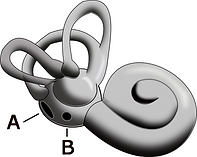Vertigo
Vertigo is the sensation of spinning, even when being still. It may feel like you are moving or the room is moving around you . Most causes of vertigo involve the inner ear (vestibular system). Each of the following can result in vertigo:
-
Inner ear infections or disorders
-
Migraines
-
Tumors
-
Stroke
-
Surgery that removes or injures the inner ear or its nerves
-
Head injury
-
A hole in the inner ear
-
BPPV
-
Tinnitus
Every year MILLIONS of people in the United States develop dizziness also called vertigo, a spinning sensation in your head that can be very disturbing.
*Lightheadedness often is caused by a brief drop in blood pressure to your head and usually improves with laying down.
Dizziness (Vertigo)
Dizziness can range from feeling light headed with positional changes to feeling like the room is spinning. The spinning can be so severe at times that is causes nausea, vomiting, sweating, or abnormal eye movement.
*If the vertigo is accompanied by double vision, difficulty speaking, a change in alertness, arm or leg weakness, or an inability to walk, you should go to the Emergency Department immediately.
Beging Paroxysmal Positional Vertigo (BPPV)


An inner ear problem that causes short periods of dizziness when your head is moved in certain positions. It is one of the most common types of vertigo, a spinning sensation in your head that can be very disturbing. It occurs most commonly when lying down, turning over in bed, or looking up. BPPV occurs when pieces of calcium carbonate material break off from a part of your inner ear and move to another part of the inner ear. When you move your head a certain way, the crystals move inside the canal and stimulate the nerve endings, causing you to become dizzy. The crystals may become loose due to trauma to the head, infection, Meniere disease, or aging, but in some cases there is no obvious cause.
How a Physical Therapist Can Help
Specific treatment will depend on the cause of your dizziness, but it can include:
-
Head and neck movements.
-
Balance Exercises
-
Activities to help the brain "correct" differences between your inner ears.
-
Exercises to improve your ability to focus your eyes and vision.
Your balance and walking may still be impaired after your vertigo has stopped, and your physical therapist can develop a treatment plan to improve this.
